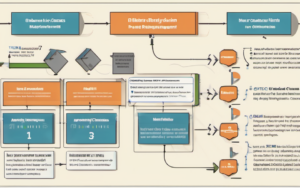The climate crisis is a pressing global issue, with its effects already being felt around the world. From rising sea levels to extreme weather events, the consequences of climate change are undeniable. The urgency of this crisis demands innovative solutions, and technology plays a crucial role in addressing it.
Introduction: The Urgent Need for Climate Action
The Growing Climate Crisis
Global temperatures are rising at an alarming rate, driven by human activities that release greenhouse gases into the atmosphere. These gases trap heat, leading to a warming planet and disrupting our climate systems. The consequences are far-reaching, including more frequent and intense heatwaves, droughts, floods, and storms. We are facing a critical turning point, and urgent action is needed to mitigate the impacts of climate change.
The Role of Technology in Climate Solutions
Technology can be a powerful tool for climate action. By harnessing the potential of innovation, we can develop solutions that reduce greenhouse gas emissions, adapt to the changing climate, and build a more sustainable future. From renewable energy technologies to carbon capture and storage, a wide range of technological advancements are being explored to address the climate crisis.
Blockchain: A Potential Game-Changer for Climate Action
Transparency and Traceability
Blockchain technology, with its inherent transparency and immutability, offers a unique opportunity to address the climate crisis. Its decentralized nature allows for the secure and verifiable tracking of carbon emissions, renewable energy production, and other environmental data. This transparency can help build trust and accountability in climate action initiatives.
Decentralization and Trust
Blockchain’s decentralized structure eliminates the need for a central authority, fostering a more collaborative and trust-based approach to environmental sustainability. This can empower individuals and organizations to participate in climate action initiatives without relying on intermediaries.
Smart Contracts and Automation
Smart contracts, self-executing agreements stored on the blockchain, can automate environmental processes, improving efficiency and reducing the need for manual intervention. For instance, they can be used to automatically track carbon emissions, manage renewable energy trading, or enforce environmental regulations.
Applications of Blockchain in Climate Solutions
Carbon Emission Tracking and Reduction
Blockchain can play a significant role in carbon emission tracking and reduction. By recording and verifying emissions data on a distributed ledger, blockchain can create a transparent and auditable system that promotes accountability and encourages emission reduction efforts.
Carbon Offsetting and Trading
Blockchain can streamline carbon offsetting and trading by providing a platform for verifying the authenticity of carbon credits and facilitating secure transactions. This can incentivize businesses and individuals to invest in projects that reduce emissions.
Supply Chain Transparency and Sustainability
By tracking the movement of goods and materials along supply chains, blockchain can promote transparency and sustainability. This allows consumers to make informed choices about products based on their environmental impact.
Renewable Energy Trading and Management
Blockchain can revolutionize renewable energy trading and management by creating a peer-to-peer energy marketplace.
Peer-to-Peer Energy Trading
Blockchain can facilitate the direct exchange of renewable energy between consumers and producers, enabling local communities to manage their energy resources more effectively.
Renewable Energy Certificates (RECs)
Blockchain can enhance the transparency and integrity of Renewable Energy Certificates (RECs), which represent the environmental attributes of renewable energy. This can encourage investment in renewable energy projects.
Climate Finance and Investment
Blockchain can facilitate climate finance by creating new mechanisms for green bonds, sustainable investments, and climate-focused crowdfunding.
Green Bonds and Sustainable Investments
Blockchain can provide a platform for issuing and trading green bonds, attracting investments towards sustainable projects. This can unlock capital for climate solutions.
Climate-Focused Crowdfunding
Blockchain-based crowdfunding platforms can enable individuals to invest in climate-related projects, democratizing access to climate finance and supporting innovation in the field.
Challenges and Considerations
Energy Consumption of Blockchain Networks
One of the main challenges of using blockchain for climate action is the energy consumption of some blockchain networks. Some blockchains require significant energy to process transactions, which can raise concerns about their environmental footprint. However, research and development are ongoing to create more energy-efficient blockchain solutions.
Scalability and Adoption
Scaling blockchain technology to accommodate large-scale climate initiatives requires further development. Moreover, widespread adoption of blockchain-based solutions requires a concerted effort from governments, businesses, and individuals.
Regulatory Frameworks and Governance
Clear regulatory frameworks and robust governance structures are essential for the successful implementation of blockchain in climate action. This will ensure the integrity, transparency, and accountability of blockchain-based initiatives.
The Promise of Blockchain for a Greener Future
A Powerful Tool for Climate Action
Blockchain technology holds immense potential for addressing the climate crisis. Its transparency, traceability, and decentralized nature can foster collaboration, accountability, and innovation in climate action initiatives.
Collaboration and Innovation are Key
Collaboration between governments, businesses, and individuals is crucial for realizing the full potential of blockchain in climate action. By working together, we can overcome challenges and develop innovative solutions that leverage the power of blockchain.
Looking Ahead: The Potential of Blockchain in a Sustainable World
The future of blockchain in climate action is promising. As the technology continues to evolve and gain wider adoption, we can expect to see a growing number of blockchain-based solutions that address the climate crisis. From carbon emission tracking to renewable energy trading, blockchain has the potential to play a transformative role in building a more sustainable future for all.




